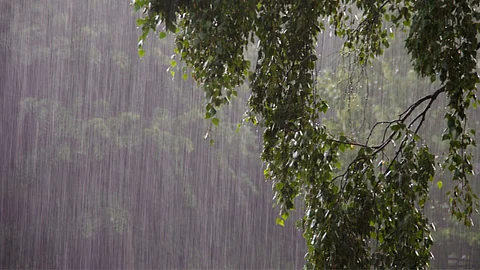
- Home
- Live Blog
- Breaking News
- Top Headlines
- Cities
- NE News
- Sentinel Media
- Sports
- Education
- Jobs

Shantanu Thakur (thakur.santanu@gmail.com)
One doesn’t know how best to put it; should I say ‘I fell in rain, or ‘fell in love with rain’? After all, it has to do with a real rainfall – an incident that happened early in my childhood – and rains have been so essentially a part and parcel of our lives.
Father was Sub-Deputy Collector at Sonari in the mid-fifties. Those were unhurried times; time moved at a relaxed pace. Our family lived in a thatch-roof official quarters with a separate structure for the kitchen. Each had a raised, slanting, sloped earthen extension called the ‘pirali’, which served as a comfortable perch to stand and stare from. You could soak in the sunlight, as well as watch rain falling in straight lines, often swayed astray by whiffs of wind. That morning it was drizzling, and there also was sunshine – what we in vernacular call “khoraxiyalor biya” – just the ideal time for a child to get lost in the magic coming down from the heavens with occasional booms of thunder. Gazing and silently wondering, I didn’t realise how and when I slipped and fell. I couldn’t bring myself to my feet as I tried to get up and then did what was the most natural thing to do, wail. Everyone present rushed out from wherever they were, my mother first from inside the kitchen, and then the whole household except my father. He was at his office.
The suburban medic said I had a fracture in the hip bone. There was a searing pain in my right leg, and I had to be carried to the left-hand-drive Willy’s jeep, a second-hand possession of my father’s. I was taken to the Assam Medical College – then a close cousin of the Berrywhite Hospital at Dibrugarh. Mother’s brother-in-law was a doctor there, and that was a big relief to my parents. The diagnosis confirmed the hipbone fracture.
Little did I know what a fascinating, unforgettable experience was then about to enter my life. My right leg from the feet upwards to the waist was put in hard plaster; even my left leg was partially near the hip. The plaster almost came up to my chest. I was put on a bed near a window in the ward. The ward was airy and well-lit, and four of the six beds were empty. Father had to leave for his duties, Mother put up with her sister, and I was left alone in almost splendid isolation. The sisters, those days, seemed to have enough time for the patients. At least one of them would be around most of the time. One would often poke me with: “Watch the rain as much as you want now; no risk of slipping!” Dibrugarh has always been a wet place, and there was rain quite often, and I could never take my eyes off them.
The hospital stay had other colourful diversions. One of the sisters would come in with a roll of coloured papers, sit near my bed and make small aeroplane models. And then throw it into the air in the ward, mesmerising me with its graceful flight and soft landing. Where are those caring sisters now? Are they still around in hospitals? Then, of course, were those fruits brought in baskets by the relatives. The fruits I didn’t like at all at that age, but relished the Horlicks no end. Finally, it was time to be released, and I was sad to leave. The hospital was like a charming new home. And I missed the Dibrugarh rains too.
Back at Sonari, I wasn’t allowed to be on my feet for more than a month. I would be lifted onto a cane chair with arms and placed in the portico to watch the world go by. Father never prevented me from watching the rains, only not from the pirali again. Rainwatch, he said, is a universally natural, creative urge, and he would rather let me indulge. My affair with rain began early with the fall that made me fall in love with it. Fortunately, we here belong to rain country, and there’s plenty of it around. One has observed people from our region feeling out of sorts and out of their elements in the heat and dust of cities like Delhi, where a good shower is so scarce. Whenever one is there during the summer and suddenly there’s a downpour, our souls simply light up and take flight. One can savour the rains almost anytime, anywhere. Right from the pirali of yore, through classroom windows, from under the canopy of umbrellas, small tables in cafeterias, from running trains, from jeeps passing through the countryside on duty, from behind teary-eyed car windscreens, to idling time on rainy days seated in the pensioner’s balcony at home. Rain gives one a bouquet of memories to preserve and muse over on a rainy day.